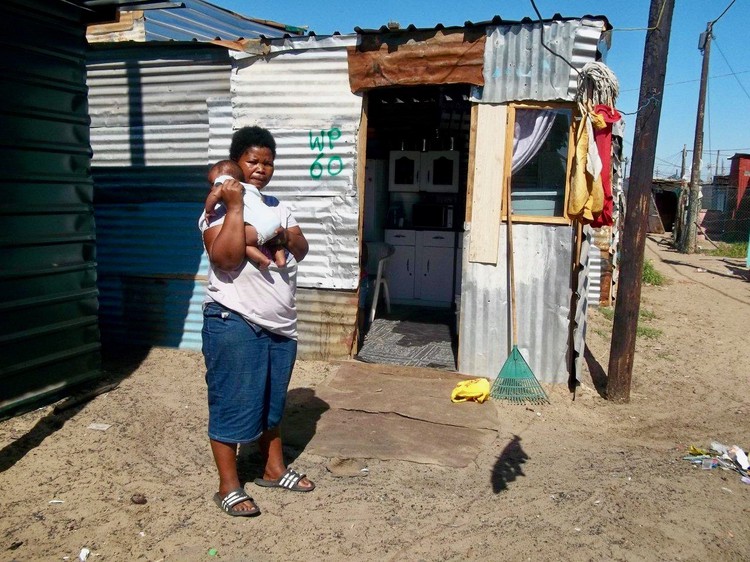
“When the fire broke out, I stepped out with only a small bucket of rice. Now, we have nothing to eat. I and my baby feel cold at night,” says Khungeka Notshokovu. Photo: Vincent Lali
20 April 2018
For years the City of Cape Town’s Disaster Risk Management Centre coordinated relief efforts for disasters in the city. It usually did a good job. But in 2018 the South African Social Security Agency (SASSA) took over this function. It’s off to a terrible start.
Fire victims are battling to restore their lives after a fire destroyed their shacks in Wallacedene, Kraaifontein, in February.
Community leader Thobani Mathole said: “Residents are used to getting disaster relief from government immediately after a fire destroys their shacks. Now, they wonder why the government is not helping them.”
Mathole said the Wallacedene fire victims did not receive food, blankets and a once-off grant after the fire. About a dozen people are affected.
“SASSA officials arrived, took details of the fire victims and promised to bring food and blankets, but they never returned to the fire scene again,” he said.
In a media release titled SASSA failure to deliver social relief after disasters hurts the poor, Albert Fritz, Western Cape Minister of Social Development, said, “It is concerning to note a growing trend in communities across the province which have experienced service delivery delays or have been left unassisted by SASSA, after a major incident or disaster.”
Fritz said, “It is simply unacceptable that SASSA is failing to deliver after it announced it would take over the distribution [from local government] of social relief, which includes providing temporary grants, food parcels/vouchers and rebuilding kits.”
In March, City of Cape Town Mayco Member for Safety and Security JP Smith cautioned: “In the past, social relief was typically activated within hours after a local disaster was reported. It remains to be seen how this change [to SASSA] will affect timelines in future.”
“The new procedure to activate social relief to disaster victims is that the City’s Disaster Risk Management Centre will notify SASSA of incidents … SASSA will then assume responsibility for notifying the service provider of the request at hand and will also monitor the delivery of social relief to the disaster victims,” Smith explained.
“The shack-dwellers lost everything during the fire. Now they are hungry and cold because they have no food and blankets,” said Mathole. “The once-off grant would help fire victims to fix their shacks and buy things they lost during the fire.”
According to JP Smith, SASSA reassessed the way it funds relief for disaster victims in 2017. Concerned that its methods could be classified as irregular expenditure, the agency decided to take over responsibility for providing humanitarian relief, including assessing situations.
The City, however, continues to provide materials for affected residents to rebuild homes. All the Wallacedene fire victims received building materials from the City and rebuilt their shacks shortly after the fire, said Mathole. “Cape Town was the only city in the country that had service level agreements with NGOs like the Mustadafin Foundation, Salvation Army and Historically Disadvantaged Individual who would provide relief including food, blankets and vanity packs to affected communities. Their claims for reimbursement would be verified by the [City’s] Disaster Risk Management Centre and submitted to SASSA for payment,” wrote Smith.
Mpumelelo Mpotye, who lives with his wife and three small children, says it was mid-month when the fire happened. “So I was broke. We were hungry because our food burned. Life became especially tough for our baby after the fire,” he said.
He had to buy food on credit and borrow money from relatives. “The fire left me wallowing in debt,” he said. Friends donated two blankets and a small mattress for his family.
“I never received any kind of help from SASSA. Not even a cent,” he said.
“We went without food for three days after the fire while we were waiting for government to help us with food and blankets,” said Pauline Malazibuye. She stays with her brother, her daughter and two grandchildren. “The whole shack burned. The fire left me with the clothes I was wearing. My grandchildren were left without school uniforms.”
“After the fire, I slept at my daughters place in Bloekombos because I had no blankets,” she said.
A pastor from Chungwoon Mission in Bloekombos brought her family one toothbrush, 1kg rice, 1kg mieliemeal, 375ml fish oil and 1kg sugar. She said, “We tried to go easy on the food, so it lasted us for a week. We starved after we finished the food.”
Thembeka Mntuyedwa said, “I had no money when the fire broke out. I only bought groceries at the end of February … We stood in a line and registered for food supply after the fire. Where is that food? We need it.”
Shivani Wahab, Senior Manager SASSA Western Cape, said, “In respect of the Disaster in Wallacedene, SASSA was not alerted to the disaster.” She said that SASSA would be meeting with the City and province “to clarify roles in respect of all disasters in the province”.
But Richard Bosman, Executive Director for Safety and Security for the City said, “This is not correct. SASSA was officially informed of the incident by the City on 20 February 2018 at 15:11, by attaching an electronic copy of a Disaster Risk Management Incident Report on Service Request 4632. The email is addressed to several SASSA officials.”
Asked who must accept the blame, Bosman said SASSA.
GroundUp also alerted SASSA to the disaster on 17 April. But by time of publication at noon on 20 April the residents had still not received relief.